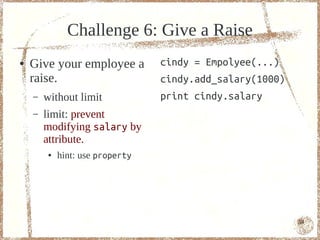Programming with Python - Adv.
- 1. Programming with Python Adv. Topics Mosky 1
- 2. Mosky: ● The examples and the PDF version are available at: – j.mp/mosky-programming-with-python. ● It is welcome to give me any advice of this slide or ask me the answers of the challenges. – mosky.tw 2
- 3. Topics ● Basic Topics ● Adv. Topics – Python 2 or 3? – Module and Package – Environment – Typing – hello.py – Comprehension – Common Types – Functional Technique – Flow Control – Object-oriented Prog. – File I/O – Useful Libraries – Documentation ● Final Project – Scope – A Blog System 3
- 4. Module and Package Write you own module and package! 4
- 5. Module and Package ● A Python file is just a Python module: – import module_a # module_a.py ● A folder which has __init__.py is just a Python package: – import package_x # __init__.py – import package_x.module_b # package_x/module_b.py – from . import module_c # (in package_x.moudle_b) package_x/module_c.py – $ python -m package_x.module_b ● Do not name your file as any built-in module. – ex. sys.py 5
- 6. Module and Package (cont.) ● The tree: – . ├── moudle_a.py └── package_x ├── __init__.py ├── module_b.py └── module_c.py 6
- 7. The import Statement ● A module is only imported at the first import. ● import module module.val = 'modified' – The module is affected by this modification. ● from module import val val = 'modified' – The module is not affected by this modification. – It does a shallow copy. 7
- 8. Typing static? dynamic? weak? strong? 8
- 9. Static Typing ● Checking types in compile time. ● Usually, it is required to give a type to a variable. ● Python is not static typing. long x short y double z c1 c2 c3 c4 c5 c6 c7 c8 9
- 10. Dynamic Typing ● Checking types in run time. ● A variable just points to an object. ● Python is dynamic typing. x object A y object b object c NOTE: This is an animation and it is not correct in the PDF version. 10
- 11. Duck Typing 11
- 12. Duck Typing (cont.) ● A style of dynamic typing. ● Happy coding without the template, the generics … etc. ● If it is necessary to check type: – if hasattr(x, '__iter__'): ● adapt the type inputed – assert not hasattr(x, '__iter__'), 'x must be iterable' ● notify the programmer – if isinstance(x, basestring): ● the worst choice 12
- 13. Duck Typing (cont.) #!/usr/bin/env python ● String and integer both # -*- coding: utf-8 -*- # file: ex_dyn.py support += operator. def dynsum(*seq): ● Write the code with r = seq[0] for item in seq[1:]: elasticity. r += item return r if __name__ == '__main__': print dynsum(1, 2, 3) print dynsum('x', 'y', 'z') 13
- 14. Duck Typing (cont.) ● BUT, it will confuse you when your project is going to big. – Name your variables with hint of type. ● item vs. items ● employee vs. employee_name ● args vs. kargs – Documentation does matter. 14
- 15. Weak Typing ● It converts the type if you do an operation which is not supported by the original type. ● In JavaScript: – 1 + '1' → '11' – 1 == '1' → true ● Python is not weak typing! 15
- 16. Strong Typing ● Only do the operations which are supported by the original type. – 1 + '1' → TypeError – 1 == '1' → False ● Python is strong typing! 16
- 18. List Comprehension [i for i in range(10)] [i ** 2 for i in range(10)] [f(i) for i in range(10)] [i for i in range(10) if i % 2 == 0] [i for i in range(10) if not i % 2 == 0] [i for i in range(10) if g(i)] 18
- 19. List Comprehension (cont.) List comprehension: is equal to: [ r = [] (i, j) for i in range(3): for i in range(3) for j in range(3): for j in range(3) r.append((i, j)) ] 19
- 20. List Comprehension (cont.) List comprehension: is equal to: [ r = [] [ for i in range(3): (i, j) t = [] for i in range(3) for j in range(3): ] t.append((i, j)) for j in range(3) r.append(t) ] 20
- 21. Generator Comprehension ● Generator comprehension: – The examples: ● (i for i in range(10)) ● f(i for i in range(10)) – It is like xrange. – Lazy evaluation → Save memory. 21
- 22. Other Comprehensions Python 3 only: ● set comprehension: – {i for i in range(10)} ● dict comprehension: – {i:i for i in range(10)} But we can do so with below statements: ● set comprehension: – set(i for i in range(10)) ● dict comprehension: – dict((i, i) for i in range(10)) 22
- 23. Functional Technique Think in the functional way. 23
- 24. The any/all Function ● def all_even(seq): return all(i % 2 == 0 for i in seq) ● all(type(item) is int for item in inputs) ● any(i < 0 for i in inputs) 24
- 25. Challenge 3-3: The Primes (cont.) – limit: in one line. [2, 3, 5, 7, 11, 13, ● hint: use any or all 17, 19, 23, 29, 31, 37, 41, 43, 47, 53, 59, 61, 67, 71, 73, 79, 83, 89, 97] 25
- 26. The zip Function ● matrix = [ [1, 2], [3, 4], ] ● zip(*matrix) 26
- 27. The zip Function (cont.) ● result = [ ('I am A.', 'email_A'), ('I am B.', 'email_B'), ] ● emails = zip(*result)[1] 27
- 28. First-class Functions #!/usr/bin/env python ● passing functions as # -*- coding: utf-8 -*- # file: ex_do.py arguments. from operator import add, mul def do(action, x, y): return action(x, y) if __name__ == '__main__': print do(add, 10, 20) print do(mul, 10, 20) 28
- 29. The lambda Expression ● lambda [args]: [expression] ● It defines an anonymous function. ● It only allows a single expression. ● f = lambda x: g(x)+h(x) ● do(lambda x, y: (x+y)*(x+y), 10, 20) 29
- 30. Use sort with Lambda ● d = dict(a=300, b=200, c=100) ● keys = d.keys() ● keys.sort(key=lambda k: d[k]) ● for k in keys: print k, d[k] 30
- 31. Use sort with Lambda (cont.) ● names = ['Andy', 'Bob', 'Cindy'] ● scores = [70, 100, 95] ● table = zip(names, scores) ● table.sort(key=lambda pair: pair[1]) ● for name, score in table: print name, score 31
- 32. The map Function ● map(lambda x: x**2, range(10)) ● map(int, '1 2 3'.split(' ')) ● map(ord, 'String') ● map(open, [<paths>]) ● map(str.split, open(<path>)) 32
- 33. The map Function (cont.) ● from operator import mul ● a = (1, 2) ● b = (3, 4) ● sum(map(mul, a, b)) 33
- 34. The filter Function ● filter(lambda i: i % 2 == 0, range(10)) ● filter(str.isdigit, strings) ● filter(lambda s: s.endswith('.py'), file_names) 34
- 35. Comprehension vs. map/filter ● [i ** 2 for i in range(10)] ● map(lambda i: i ** 2, range(10)) ● [i ** 2 for i in range(10) if i % 2 == 0] ● map(lambda i: i ** 2, filter( lambda i: i % 2 == 0, range(10) )) 35
- 36. Comprehension vs. map/filter (cont.) ● [ord(c) for c in 'ABC'] ● map(ord, 'ABC') 36
- 37. Comprehension vs. map/filter (cont.) Compare the speeds of them: 1. map/filter (with built-in function) 2. comprehension 3. map/filter 37
- 38. The reduce Function ● # from functools import reduce # py3 ● from operator import add ● seq = [-1, 0, 1] ● reduce(add, s) ● seq = ['reduce ', 'the ', 'lines.'] ● reduce(add, s) 38
- 39. The partial Function ● from functools import partial ● from operator import add ● rdsum = partial(reduce, add) ● rdsum([-1, 0, 1]) ● rdsum(['reduce ', 'the ', 'lines.']) 39
- 40. The partial Function (cont.) ● from functools import partial ● from fractions import gcd as _gcd ● _gcd(6, 14) ● gcd = partial(reduce, _gcd) ● gcd([6, 14, 26]) 40
- 41. Closure ● from math import log ● def mklog(n): return lambda x: log(x, n) ● log10 = mklog(10) ● log10(100) # n = 10 41
- 42. Closure (cont.) ● setattr(DictLike, attrname, # it is a colsure (lambda x: property( lambda self: self.__getitem__(x), lambda self, v: self.__setitem__(x, v), lambda self: self.__delitem__(x) ) )(attrname) ) 42
- 43. The yield Statement ● def mkgen(n): for i in range(n): yield i ** 2 ● It is a generator. ● gen = mkgen(10) ● for i in gen: print i 43
- 44. Decorator ● def deco(f): def f_wrapper(*args, **kargs): print 'DEBUG: ', args, kargs return f(*args, **kargs) return f_wrapper ● @deco # is equal to add = deco(add) def add(x, y): return x+y ● add(1, 2) 44
- 45. Object-oriented Programming is also available. 45
- 46. The class Statement class Example(object): class_attribute = 1 def method(self, …): pass example = Example() print example 46
- 47. The Class in Python (cont.) ● Everything in Python is object. – Class is an object, too. ● All class inherit the object → new-style classes – Use new-style classes. It provides more features. – Python 3: auto inherit the object. ● Supports multiple inheritance. – Searching attributes/methods is like BFS. 47
- 48. Bound and Unbound Method ● unbound method – def m(self, ...) – C.m(c, ...) ● bound method (instance method) – c.m(...) 48
- 49. Class Method and Static Method ● class method – @classmethod def m(cls, …) – C.m() – c.m() ● static method – @staticmethod def m(...) – C.m() – c.m() 49
- 50. The Data Model of Python ● Special methods – __init__ – __str__ – __repr__ – __getitem__ → x[key] – __setitem__ → x[key] = value – __delitem__ → del x[key] … ● ref: docs.python.org/2/reference/datamodel.html 50
- 51. Protocol ● It like interface, but it is only described in doc. ● The examples: – iterator protocol ● object which supports __iter__ and next – readable ● object which supports read – ... 51
- 52. The employee class ● see examples/ex_empolyee.py . 52
- 53. Do Math with Classes ● see examples/ex_do_math_with_classes/ . 53
- 54. Challenge 6: Give a Raise ● Give your employee a cindy = Empolyee(...) raise. cindy.add_salary(1000) – without limit print cindy.salary – limit: prevent modifying salary by attribute. ● hint: use property 54
- 55. Useful Libraries import antigravity 55
- 56. Useful Libraries The built-in libraies: – random – pickle – datetime – json – re – pprint – hashlib/hmac – gzip – decimal – timeit – glob – logging – collections – unitest – subprocess – doctest – multiprocessing – pdb – gc ... 56
- 57. Useful Libraries (cont.) The third-party libraries on PyPI: – Requests – Use it instead of the poor built-in urllib. – lxml – Do you need to parse HTML? Use it! – PyYAML – YAML is a the best of data serialization standards. – PIL – Python Image Library – NumPy and SciPy – are for mathematics, science, and engineering. – SymPy – is for symbolic mathematic – Bottle, Flask or Django – are the web frameworks. – Sphinx – helps you to create documentation. ... 57
- 58. Challenge 7: Iterable Interger ● Make integer iterable. x = IterableInt(10) – without limit for b in x: – limit 1: don't use string print b – limit 2: use collection ● hint: use property 0 1 0 1 58
- 59. Final Project : A Blog System 59
- 60. Final Project : A Blog System ● The cookbook: – Flask – A micro web framework. – Use pickle to store the posts. – Optional: ● A database instead of pickle. (ex. MySQL, PostgreSQL, ...) ● A cache layer. (ex. memcached, redis, ...) ● A message queue for async jobs. (ex. RabbitMQ, ...) 60
- 61. It is the end. Contact me? http://mosky.tw/ 61



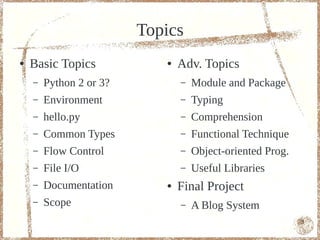


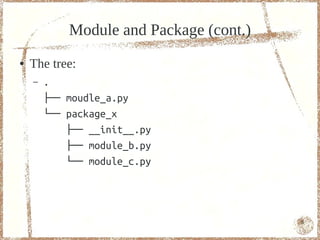
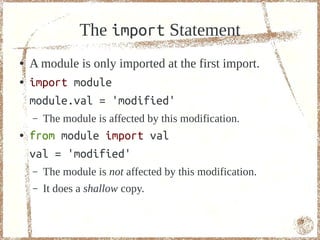

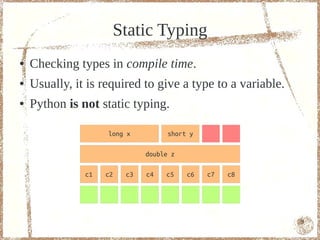

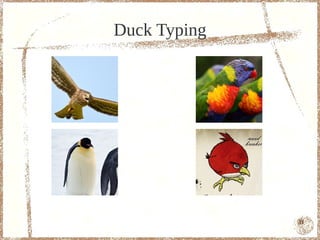

![Duck Typing (cont.)
#!/usr/bin/env python ● String and integer both
# -*- coding: utf-8 -*-
# file: ex_dyn.py support += operator.
def dynsum(*seq): ● Write the code with
r = seq[0]
for item in seq[1:]:
elasticity.
r += item
return r
if __name__ == '__main__':
print dynsum(1, 2, 3)
print dynsum('x', 'y', 'z')
13](https://image.slidesharecdn.com/programming-with-python-adv-130312114202-phpapp02/85/Programming-with-Python-Adv-13-320.jpg)




![List Comprehension
[i for i in range(10)]
[i ** 2 for i in range(10)]
[f(i) for i in range(10)]
[i for i in range(10) if i % 2 == 0]
[i for i in range(10) if not i % 2 == 0]
[i for i in range(10) if g(i)]
18](https://image.slidesharecdn.com/programming-with-python-adv-130312114202-phpapp02/85/Programming-with-Python-Adv-18-320.jpg)
![List Comprehension (cont.)
List comprehension: is equal to:
[ r = []
(i, j) for i in range(3):
for i in range(3) for j in range(3):
for j in range(3) r.append((i, j))
]
19](https://image.slidesharecdn.com/programming-with-python-adv-130312114202-phpapp02/85/Programming-with-Python-Adv-19-320.jpg)
![List Comprehension (cont.)
List comprehension: is equal to:
[ r = []
[ for i in range(3):
(i, j) t = []
for i in range(3) for j in range(3):
] t.append((i, j))
for j in range(3) r.append(t)
]
20](https://image.slidesharecdn.com/programming-with-python-adv-130312114202-phpapp02/85/Programming-with-Python-Adv-20-320.jpg)



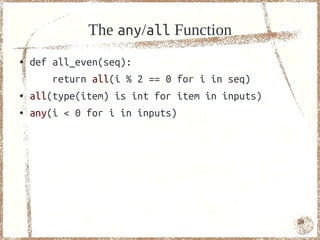
![Challenge 3-3: The Primes (cont.)
– limit: in one line. [2, 3, 5, 7, 11, 13,
● hint: use any or all 17, 19, 23, 29, 31,
37, 41, 43, 47, 53,
59, 61, 67, 71, 73,
79, 83, 89, 97]
25](https://image.slidesharecdn.com/programming-with-python-adv-130312114202-phpapp02/85/Programming-with-Python-Adv-25-320.jpg)
![The zip Function
● matrix = [
[1, 2],
[3, 4],
]
● zip(*matrix)
26](https://image.slidesharecdn.com/programming-with-python-adv-130312114202-phpapp02/85/Programming-with-Python-Adv-26-320.jpg)
![The zip Function (cont.)
● result = [
('I am A.', 'email_A'),
('I am B.', 'email_B'),
]
● emails = zip(*result)[1]
27](https://image.slidesharecdn.com/programming-with-python-adv-130312114202-phpapp02/85/Programming-with-Python-Adv-27-320.jpg)

![The lambda Expression
● lambda [args]: [expression]
● It defines an anonymous function.
● It only allows a single expression.
● f = lambda x: g(x)+h(x)
● do(lambda x, y: (x+y)*(x+y), 10, 20)
29](https://image.slidesharecdn.com/programming-with-python-adv-130312114202-phpapp02/85/Programming-with-Python-Adv-29-320.jpg)
![Use sort with Lambda
● d = dict(a=300, b=200, c=100)
● keys = d.keys()
● keys.sort(key=lambda k: d[k])
● for k in keys:
print k, d[k]
30](https://image.slidesharecdn.com/programming-with-python-adv-130312114202-phpapp02/85/Programming-with-Python-Adv-30-320.jpg)
![Use sort with Lambda (cont.)
● names = ['Andy', 'Bob', 'Cindy']
● scores = [70, 100, 95]
● table = zip(names, scores)
● table.sort(key=lambda pair: pair[1])
● for name, score in table:
print name, score
31](https://image.slidesharecdn.com/programming-with-python-adv-130312114202-phpapp02/85/Programming-with-Python-Adv-31-320.jpg)
![The map Function
● map(lambda x: x**2, range(10))
● map(int, '1 2 3'.split(' '))
● map(ord, 'String')
● map(open, [<paths>])
● map(str.split, open(<path>))
32](https://image.slidesharecdn.com/programming-with-python-adv-130312114202-phpapp02/85/Programming-with-Python-Adv-32-320.jpg)
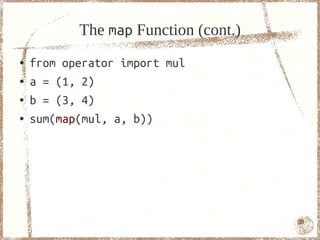

![Comprehension vs. map/filter
● [i ** 2 for i in range(10)]
● map(lambda i: i ** 2, range(10))
● [i ** 2 for i in range(10) if i % 2 == 0]
● map(lambda i: i ** 2, filter(
lambda i: i % 2 == 0,
range(10)
))
35](https://image.slidesharecdn.com/programming-with-python-adv-130312114202-phpapp02/85/Programming-with-Python-Adv-35-320.jpg)
![Comprehension vs. map/filter (cont.)
● [ord(c) for c in 'ABC']
● map(ord, 'ABC')
36](https://image.slidesharecdn.com/programming-with-python-adv-130312114202-phpapp02/85/Programming-with-Python-Adv-36-320.jpg)

![The reduce Function
● # from functools import reduce # py3
● from operator import add
● seq = [-1, 0, 1]
● reduce(add, s)
● seq = ['reduce ', 'the ', 'lines.']
● reduce(add, s)
38](https://image.slidesharecdn.com/programming-with-python-adv-130312114202-phpapp02/85/Programming-with-Python-Adv-38-320.jpg)
![The partial Function
● from functools import partial
● from operator import add
● rdsum = partial(reduce, add)
● rdsum([-1, 0, 1])
● rdsum(['reduce ', 'the ', 'lines.'])
39](https://image.slidesharecdn.com/programming-with-python-adv-130312114202-phpapp02/85/Programming-with-Python-Adv-39-320.jpg)
![The partial Function (cont.)
● from functools import partial
● from fractions import gcd as _gcd
● _gcd(6, 14)
● gcd = partial(reduce, _gcd)
● gcd([6, 14, 26])
40](https://image.slidesharecdn.com/programming-with-python-adv-130312114202-phpapp02/85/Programming-with-Python-Adv-40-320.jpg)



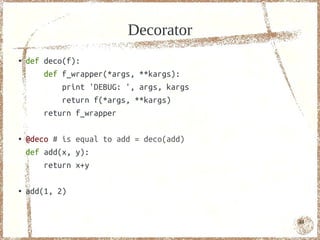


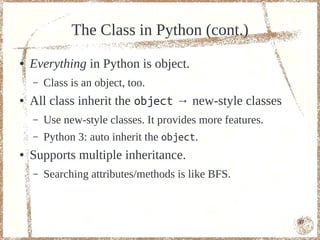


![The Data Model of Python
● Special methods
– __init__
– __str__
– __repr__
– __getitem__ → x[key]
– __setitem__ → x[key] = value
– __delitem__ → del x[key]
…
● ref:
docs.python.org/2/reference/datamodel.html
50](https://image.slidesharecdn.com/programming-with-python-adv-130312114202-phpapp02/85/Programming-with-Python-Adv-50-320.jpg)



